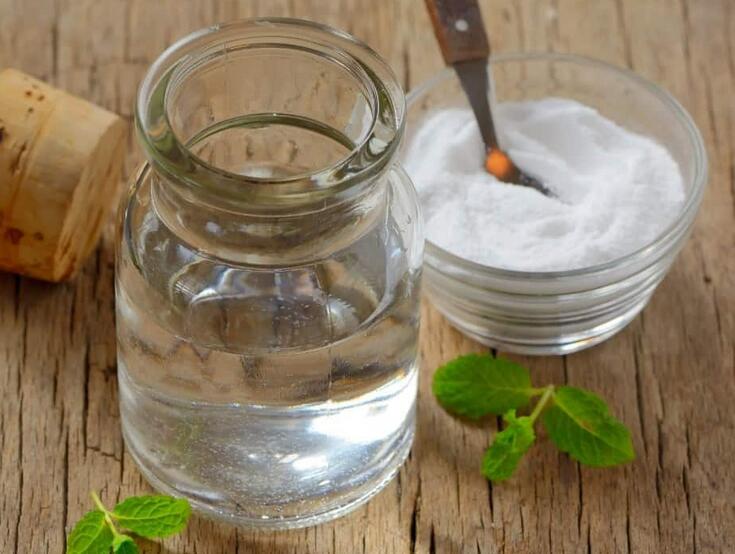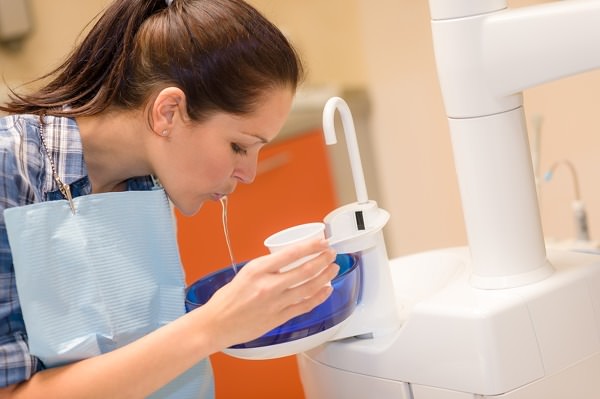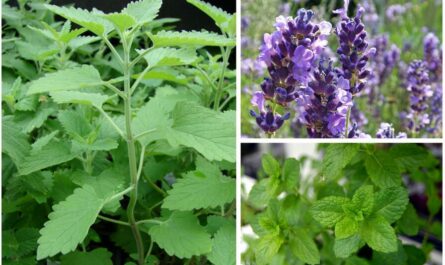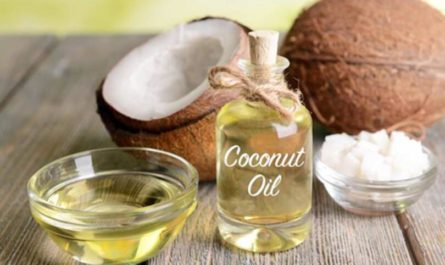Are you looking for a natural, cost-effective way to maintain your oral health? Look no further than this simple homemade baking soda mouthwash recipe. With just a few ingredients you likely already have in your kitchen, you can create a refreshing, effective mouthwash.
Baking soda, chemically known as sodium bicarbonate (NaHCO₃), is a versatile compound with numerous household and health applications. When it comes to oral health, baking soda’s effectiveness lies in its ability to neutralize acids, gently polish teeth, and combat harmful bacteria. This article will discuss how to make homemade baking soda mouthwash recipe step by step.

Health Benefits of Homemade Baking Soda Mouthwash
Before we dive into the recipe, let’s explore the benefits of using baking soda mouthwash.
1. Neutralizes Acid and Balances pH
Your mouth’s pH level plays a crucial role in maintaining dental health. A neutral pH is around 7, while a pH below 7 is acidic, and above 7 is alkaline.
When you consume sugary or acidic foods and drinks, the bacteria in your mouth feed on the sugars and produce acid as a byproduct. This acid can lower the pH in your mouth, creating an environment that promotes tooth decay.
Baking soda, being slightly alkaline with a pH around 8.3, helps neutralize these acids, bringing your mouth’s pH back to a more neutral level. By reducing the acidity in your mouth, baking soda helps prevent the demineralization of tooth enamel.
2. Fights Bad Breath
Bad breath, or halitosis, is a common problem that can be caused by various factors. This includes poor oral hygiene, certain foods, and underlying health conditions. Baking soda mouthwash can help combat bad breath by neutralizing odor-causing acids and bacteria in your mouth, leaving you with fresher, cleaner breath.
3. Whitens Teeth Naturally
Baking soda is known for its mild abrasive properties, which can help remove surface stains on your teeth, resulting in a brighter, whiter smile. By using baking soda mouthwash regularly, you can gently polish your teeth and reduce the appearance of stains caused by coffee, tea, or other pigmented foods and drinks.
4. Prevents Tooth Decay
The acid-neutralizing properties of baking soda mouthwash not only help maintain a healthy pH balance in your mouth but also prevent tooth decay.
When acid levels are kept in check, your tooth enamel is less likely to erode, reducing your risk of developing cavities and other dental problems.
5. Soothes Canker Sores
Canker sores, also known as aphthous ulcers, are small, painful lesions that can develop inside your mouth. Baking soda mouthwash can help soothe and heal these sores by reducing inflammation and promoting faster healing. The alkaline nature of baking soda helps neutralize the acidic environment that can aggravate canker sores.
6. Relieves Dry Mouth
Dry mouth, or xerostomia, occurs when your salivary glands don’t produce enough saliva to keep your mouth moist. This condition can lead to discomfort, difficulty speaking or swallowing, and an increased risk of tooth decay.
Baking soda mouthwash can help alleviate dry mouth symptoms by stimulating saliva production and moisturizing your oral tissues.
7. Promotes Gum Health
Baking soda mouthwash can also contribute to healthier gums by reducing inflammation and preventing the buildup of plaque and tartar.
The antibacterial properties of baking soda help control harmful bacteria that can cause gum disease, while its gentle abrasiveness can help remove plaque and food particles along the gum line.
8. Affordable and Accessible
One of the most appealing aspects of homemade baking soda mouthwash is its affordability and accessibility. Baking soda is an inexpensive, readily available ingredient that most people already have in their homes.
By making your mouthwash, you can save money on expensive commercial products while still enjoying the benefits of a high-quality oral hygiene solution.
9. Customizable with Essential Oils
Another advantage of homemade baking soda mouthwash is the ability to customize it with essential oils. Essential oils like peppermint, spearmint, or tea tree can add a refreshing flavor to your mouthwash while providing additional antibacterial and breath-freshening benefits.
Simply add a few drops of your favorite essential oil to your baking soda mouthwash for a personalized touch.
10. Gentle on Sensitive Teeth
Many commercial mouthwashes contain harsh ingredients like alcohol, which can irritate sensitive teeth and gums. Baking soda mouthwash, on the other hand, is gentle and non-irritating.
This makes it an excellent choice for people with sensitive oral tissues. The mild abrasiveness of baking soda can help desensitize teeth over time, reducing sensitivity and discomfort.
11. Complements Other Oral Hygiene Practices
While baking soda mouthwash offers numerous benefits, it should be used in conjunction with other oral hygiene practices for optimal results.
Brushing your teeth, flossing daily, and visiting your dentist regularly are all essential components of a comprehensive oral care routine. Baking soda mouthwash can complement these practices, providing an extra layer of protection and freshness.
12. Easy to Make at Home
Making your own baking soda mouthwash is a simple, straightforward process that requires only a few ingredients. Simply mix the ingredients together until the baking soda and salt have dissolved, and your mouthwash is ready to use.

How to Make Homemade Baking Soda Mouthwash Recipe
Now that you understand the science behind baking soda’s oral health benefits, let’s get started with the recipe. Here are a few variations you can try:
Basic Baking Soda Mouthwash
- 1 cup of warm water
- 1/4 teaspoon of baking soda
- 1/8 teaspoon of salt
Super Simple Mouthwash
- 1 cup of filtered water
- 4 teaspoons of baking soda
- 4 drops of tea tree essential oil
- 4 drops of peppermint essential oil
Baking Soda and Salt Mouthwash
- 1 cup of warm water
- 1/2 teaspoon of baking soda
- 1/2 teaspoon of salt
pH Balancing Mouthwash
- 1 tablespoon salt
- 1 tablespoon baking soda
- 3 cups filtered water
- 5 drops essential oil (peppermint or clove)
- Optional: a splash of vodka as a preservative
Instructions:
- In a clean glass jar or container, mix the dry ingredients (baking soda and salt if using) until well combined.
- Add the warm water and stir until the baking soda and salt have completely dissolved.
- If desired, add a few drops of essential oils like peppermint, clove, or tea tree for flavor and extra freshness.
- Your homemade baking soda mouthwash is ready to use! Always shake well before each use.
To use, simply swish a small amount (about 1-2 tablespoons) of the mouthwash around in your mouth for 30 seconds, then spit it out. Rinse your mouth with plain water afterward. Use this mouthwash once or twice daily as part of your oral hygiene routine.
Tips and Precautions
While baking soda mouthwash is generally safe for most people, there are a few things to keep in mind:
- Don’t Swallow: Although baking soda is non-toxic, it’s best to avoid swallowing large amounts of the mouthwash. Always spit it out after use.
- Not a Replacement for Brushing and Flossing: While this mouthwash can help maintain oral health, it should be used in conjunction with regular brushing and flossing, not as a replacement.
- Consult Your Dentist: If you have any pre-existing dental conditions or concerns, it’s always best to consult with your dentist before incorporating a new oral hygiene product into your routine.
- Use Fresh Baking Soda: Make sure to use a fresh box of baking soda, not one that’s been absorbing odors in your fridge.
- Don’t Overuse: While it’s safe to use this mouthwash daily, limit use to once or twice a day. Overuse of baking soda can potentially disrupt the natural balance of bacteria in your mouth.
- Be Gentle: When using this mouthwash, swish it around gently in your mouth. Avoid vigorous swishing or gargling, as this may irritate your gums or soft tissues.
How to Customize Your Mouthwash?
One of the great things about making your mouthwash is that you can customize it to suit your preferences. Here are a few ideas:
- Add Other Essential Oils: In addition to peppermint, you can experiment with other essential oils like spearmint, cinnamon, clove, or tea tree for different flavors and benefits. Just be sure to use pure, high-quality essential oils that are safe for oral use.
- Adjust the Consistency: If you prefer a thicker mouthwash, you can add a bit more baking soda. For a thinner consistency, simply add more water. Find the ratio that works best for you.
- Make a Larger Batch: This recipe can easily be doubled or tripled to make a larger batch. Just be sure to store it in an airtight container at room temperature. If you make a larger batch, use it within a week for optimal freshness.
- Add a Natural Sweetener: If you find the taste of plain baking soda mouthwash a bit too salty or bitter, you can add a small amount of stevia or xylitol for a touch of sweetness. These natural sweeteners won’t contribute to tooth decay like sugar can.
How to Incorporating Baking Soda Mouthwash into Your Oral Hygiene Routine
To get the most benefit from your homemade baking soda mouthwash, it’s important to use it consistently as part of a comprehensive oral hygiene routine. Here’s a suggested routine:
- Brush Your Teeth: Start by brushing your teeth with fluoride toothpaste for two minutes, making sure to clean all surfaces of your teeth.
- Floss: After brushing, floss between each tooth to remove plaque and food particles that your toothbrush can’t reach.
- Use Baking Soda Mouthwash: Swish a small amount of your homemade baking soda mouthwash around in your mouth for 30 seconds, then spit it out. Rinse your mouth with plain water afterward.
- Tongue Cleaning: Don’t forget to gently brush or scrape your tongue to remove bacteria and freshen your breath.
By following this routine twice daily, in the morning and before bed, you’ll be well on your way to maintaining optimal oral health.
The Bottom Line
Creating your own homemade baking soda mouthwash is a simple, natural way to support your oral health. With its ability to neutralize acids, freshen breath, and gently whiten teeth, this mouthwash is a great addition to your dental hygiene routine.
Remember, while this mouthwash is effective, it’s not a substitute for regular brushing, flossing, and professional dental check-ups. You need to use it in conjunction with these practices for the best results.
So, go ahead and give these easy recipes a try! Your teeth and gums will thank you for the natural TLC, and you’ll love the fresh, clean feeling it provides. Happy swishing!






